Dell Studio XPS 16: the Eyes Have It
by Jarred Walton on April 2, 2009 6:00 PM EST- Posted in
- Laptops
Display Quality
The last area we want to test is the display quality. We have stated in the past that laptop LCDs pale in comparison to typical desktop LCDs, but the Studio XPS 16 tries to buck that trend. We've hinted that it succeeds, and here you can see the results of our testing.
We test color accuracy using ColorEyes Display Pro, and we test with two different colorimeters, a DTP-94 and an i1 Display2. We test the laptops with both colorimeters using ColorEyes Display Pro, generating both LUT and Matrix color profiles. The reason we do this is that some displays respond better to LUT profiling while others work better with Matrix profiling. We select the best result out of the four tests for our color accuracy charts.
Besides the color accuracy, the generated profiles allow us to determine color gamut, using GamutVision. We use the matrix color profiles for gamut, as they usually have ~10% higher gamut volume. We will also report the maximum LCD brightness and contrast ratio.
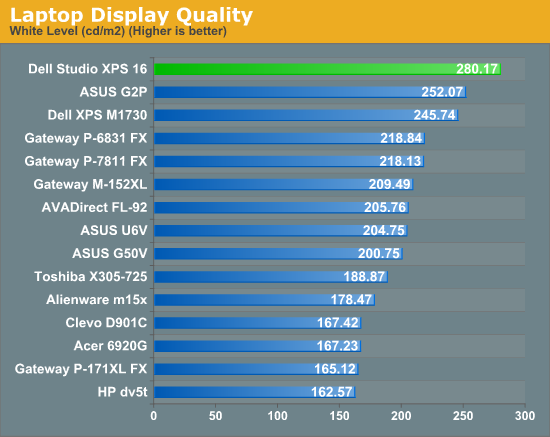
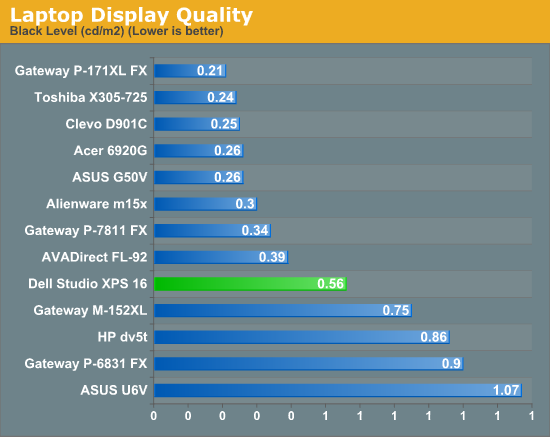
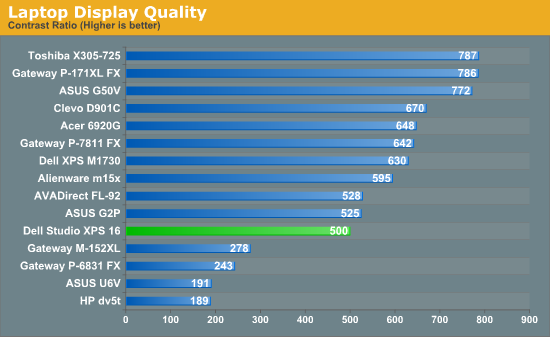
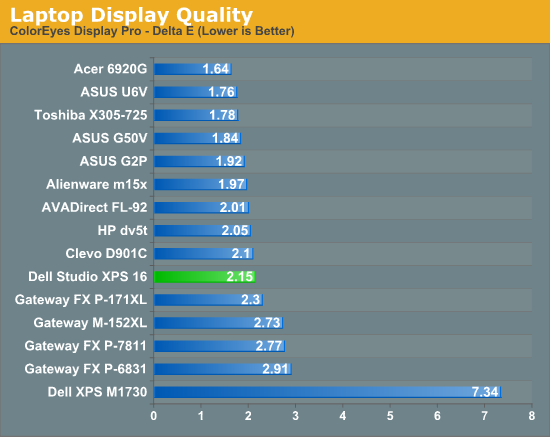
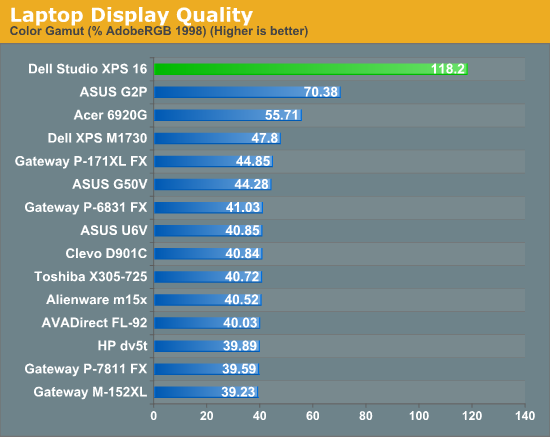
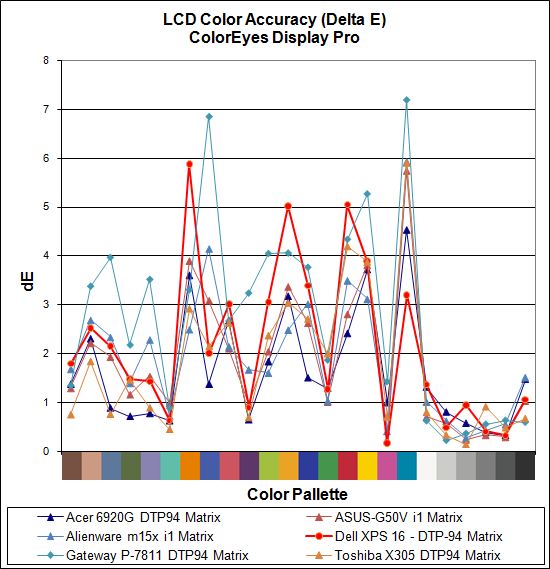
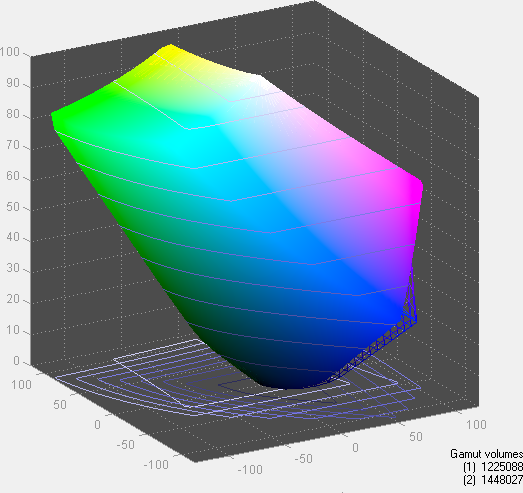
If you just scan over those graphs quickly, you might not be very impressed by the Studio XPS 16 LCD. Color accuracy is middle of the road, and contrast ratio and black levels are nothing special either. The maximum brightness is at the top of the charts, but again that's reflected with the higher than average black level. Here's the catch: contrast ratios above 500:1 are definitely a case of diminishing returns. It's very easy to look at something like the Gateway P-6831 and the Studio XPS 16 and see that the P-6831 has a poor contrast ratio. However, eyeballing the difference between the XPS 16 and any of the higher contrast ratios and determining which is "better" is far more difficult.
The big deal with the RGB LED backlighting is in the last chart. A color gamut of over 100%? In a laptop LCD? You can't be serious! Granted, we haven't tested every single laptop LCD out there, but the vast majority of laptops we've looked at have displays that can't even reach 50% color gamut. In fact, we haven't even tested a desktop LCD that has hit 118% (though Dell's 2480WFP came close and newer display have almost certainly surpassed that mark).
The ASUS G2P was one of my favorite laptops for a long time simply because of the LCD. The Acer 6920G impressed me by offering an image that was visibly better than other laptops, even though it couldn't compete with desktop LCDs. The RGB LED 1080p display on the Studio XPS 16 offers over twice the color gamut of the Acer 6920G. Again, there's a case of diminishing returns - anything beyond about 80% doesn't usually impact how you see colors unless you're really picky. However, this is the first laptop LCD to break the 80% barrier, let alone surpassing any desktop LCD that we've currently tested.
Even though the color gamut is much better than any other laptop we've tested, we do need to contain our enthusiasm somewhat. At its heart, this is still a TN panel, which means the overall quality can't match PVA, MVA, or IPS panels. Dell - or Seiko Epson if you prefer, as they're the panel manufacturer - has taken the first step by offering an improved color gamut on a laptop display. We're still a little baffled as to why no one seems to be interested in making new PVA or IPS laptop panels, as the combination of a high gamut backlight with an IPS panel would be ideal. This is still a great display, but when I want to do some serious image editing I'm still going back to my S-IPS desktop LCD.










79 Comments
View All Comments
JarredWalton - Sunday, April 5, 2009 - link
I don't have updated scores with new drivers, but you can see the http://www.anandtech.com/mobile/showdoc.aspx?i=324...">original XPS M1730 3DMark scores - including scores with the CPU overclocked. I didn't have 3DMark Vantage at the time, so those scores are also missing. Basically, the scores are relatively close to the Clevo D901C laptop.Hrel - Thursday, April 2, 2009 - link
I have a Dell Studio 15 Series laptop T8100 320GB HDD X3100GMA... it's okay for the most part; wish it had some kind of useable graphics, but I couldn't afford the upgrade. Anyway, the slot loading DVD drive is a pain in the but! It quirks out sometimes when you hit eject and just keeps trying to eject the disc even if it's already out until you restart the whole thing; one time even after doing that it just wouldn't take discs for like 5 days at all. Then randomly it started working again. Not to mention if it ever DOES fail I'm gonna have to pay more for the replacement than I would if it was a standard cd tray drive; I REALLY don't like that choice of DVD drives.Also, on a 16" 16:9 Chassis they really should include a keyboard that has a dedicated num pad. Asus includes a full numpad on their 15.6" 16:9 chassis. On that note though, the keyboard on my Studio 15 is well laid out and pleasant to type on.
QChronoD - Thursday, April 2, 2009 - link
Where the measurements for the screen done with the out-of-the-box settings, or was it calibrated first?JarredWalton - Thursday, April 2, 2009 - link
Calibrated. As best as I can tell, there's no truly reliable way of testing the color accuracy without calibrating. I tried to do it in the past, but I became suspect of my results. Besides, if you need accurate colors there's generally no way around hardware calibration utilities.DigitalFreak - Thursday, April 2, 2009 - link
Windows Vista Hope Premium? :0)JarredWalton - Thursday, April 2, 2009 - link
Truth in advertising? :-DLingyis - Monday, May 3, 2010 - link
bad news--i was just gonna get one of these babies and Dell told me Studio XPS 16 no longer comes with an RGB LED option.i want a good laptop display--i'm deciding between the Studio XPS with a regular WLED vs the Precision M4500. The precision M6500 appears to have RGB LED but it's 17 inches which is too big.
so what to go for--the RGBLED-less Studio XPS or the Precision M4500?
brock5 - Tuesday, September 28, 2010 - link
Eyes are the most sensitive part of our body and all <a href="http://rjneyeinstitute.org"> Eye disease </a> are equally capable of harming the eyes, as they are very delicatebrock56 - Saturday, November 13, 2010 - link
Eyes are the most sensitive part of our body and all <a href="http://rjneyeinstitute.org"> Eye disease </a> are equally capable of harming the eyes, as they are very delicate